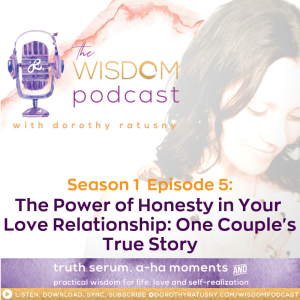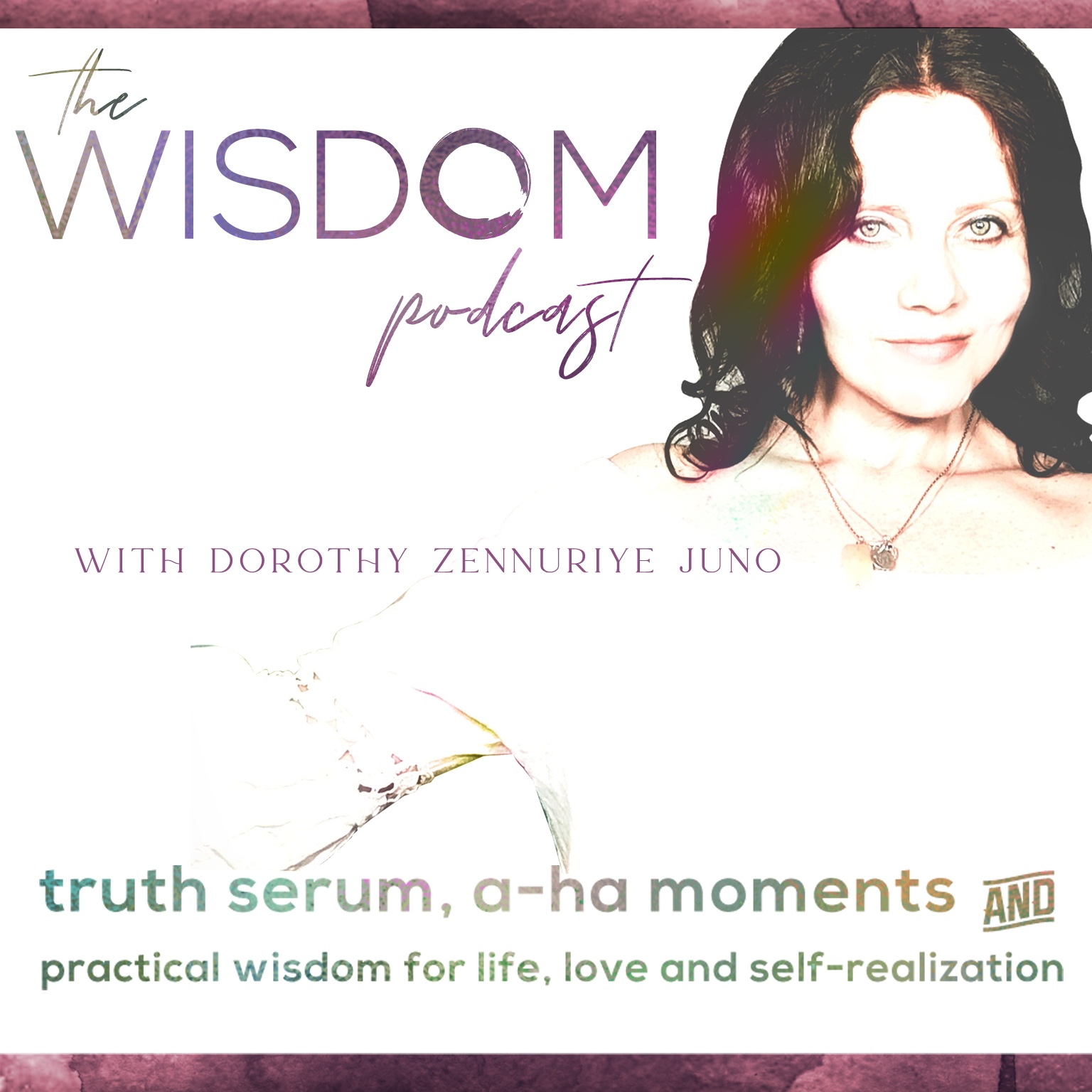Episodes

Sunday Oct 27, 2019
Sunday Oct 27, 2019

The Power of Honesty in Your Love Relationship: One Couple's True Story
The WISDOM podcast Season 1 Episode 5
TIMESTAMPS:
Podcast Intro: 0-1:32 | Introducing the Story of Michael and Tara: 1:37 | How Therapy Helps to Heal the Past and Present: 7:46 | Your Awakening Moment: 9:17 | How We Teach Others How to Treat Us: 10:20 | The Rest of 'Their Story' - Michael and Tara: 11:26 | What Honesty Gives You: 13:42 | Advice for Offering Feedback to a Loved One: 14:22
In this episode we discover how Michael and Tara were able to acknowledge how what they were living was inauthentic, and how facing their personal inner truth would set them free to find new love; and to choose this based on what was right and best for each of them.
My client Michael* diverted his eyes, gazing down, visibly recoiling into himself; as if he was trying to make himself invisible. He was unable to make eye contact for several moments. Tears came to his eyes and he could not keep up with wiping them as more tears, ran down his cheeks.
It can be difficult for us to admit our mistakes, our vulnerabilities - and ultimately what we do that hurts those we love. Perhaps for some this is a learned behaviour; a subconscious but real fear that originated in childhood, where admitting fault would lend itself to being scolded, perhaps humiliated, and punished. If we are not self aware, then yes, we may not realize how our actions and words affect and hurt another. Or perhaps, as Michael revealed of his own behaviour, we often do realize when we have potentially said or done something that is hurtful, but avoid acknowledging and admitting this in the idealized hope that we are mistaken, or that we can avoid what would cause us to feel badly about our self.
Why do we have a difficult time acknowledging when we have done something that is not a true portrayal of the goodness that we are indeed capable of?
To acknowledge your mistakes is to have the immediate opportunity to 'right' them.
Michael had sought my help to save his marriage. It was weeks earlier that his wife Tara* had said that she wanted to separate. Michael was devastated. He was now desperate to do whatever he could to repair this relationship. Only later would I discover that perhaps Michael, wasn't at all surprised by Tara's decision.
It was difficult at first for Michael to admit outwardly the words and actions that had hurt his wife so deeply over the cumulative two decades that they had been 'in relationship'. It wasn't until Tara attended a session of therapy on her own with myself, that she was able to explain how she came to make the difficult decision to end the marriage; how she tried to rekindle the feelings of love, that she once felt for Michael despite his cutting sarcasm, his finger pointing and blame, his disrespectful words and a lack of loving actions that had been the catalyst for how her feelings changed towards her husband. Holding in the hurt and the many 'let downs' that Tara continued to experience in the marriage, meant an inevitable sadness and despair that grew into intolerance, disinterest, and dislike.
Upon leaving her first therapy session with me, Tara went to speak with Michael. She later described how empowering it was to have 'found her voice' and the courage to speak her truth. Tara shared with Michael many examples of how he had been hurtful over the years, and explained why she had stopped talking about her feelings and what bothered her. Tara learned to hold back from expressing her sadness and hurt since (as she explained), it was repeatedly reciprocated with Michael's denial and hostility.
"We can be in a love relationship and yet this doesn't mean that we are skilled at it. A relationship requires ongoing attention, effort, and the willingness to give of yourself in honesty and loving kindness. A love relationship will also inspire personal growth and the desire to become a better version of yourself. This is a calling that you must attend to." - dorothy ratusny
It was largely Tara's words spoken with complete openness and honesty that Michael came to realize that he allowed his ego to get in the way of being honest, kind, and vulnerable with the one person that had loved him unconditionally. Back in my office after that pivotal meeting with his wife, Michael admitted with remorse that he was finally ready to acknowledge the pattern of behaviour that reflected a lack of kindness, respect and love. As much as he had glimpses of the disrespectful and abusive way in which he conducted himself, Michael would still attempt to dismiss his behaviour, justifying his actions and unwilling to see himself as he was; with honesty and clarity.
My client's life was an example of how we treat others based on the way in which we are with our self, the end result of what we have been taught in our family of origin and our inability or unwillingness to be self-honest and to seek to make personal changes.
As an adult, we can no longer blame our childhood or any earlier life experience as an excuse for how we treat others. The work of therapy is to heal the past including how we were taught to think of and treat our self and others. As we choose to adopt healthy and respectful ways of being and to treat others with kindness and consideration, we build self-worth and reclaim a feeling of wholeness; and pride in our ability to be loving kindness. As we practice kindness directed inward; as we find the good in our self to dwell upon and feel positive about, it becomes easier to be this with others; and to treat others perhaps not the way that we were treated, but the way in which we should have been treated.
I help clients to fix or change a problematic situation; often this is the result of how they are not able (or at times willing) to act with compassion and love; and ultimately to correct the behaviours that cause much suffering unto themselves. This change begins with awareness of the impact of one's words and actions onto their self, and others. When you awaken, you see your self with honesty and accuracy. Awakening highlights what thoughts or actions have contributed to your suffering. Being self-aware allows you to choose how you will be different; and what is needed in order to have better relationships, to improve your current life circumstances, and ultimately how you think and feel towards your self, others, and the world.
"In therapy, together we conduct what becomes a personal discovery in order to achieve awareness; to shed light on a situation and your self, and to see everything with a clear and accurate perspective, so that you can begin to draw insights into how you are living your life that reveals just how you are causing your own suffering (and often, the suffering of others)." - dorothy ratusny
We teach others how to treat us by how we respond to their words and actions. If you want to build a solid relationship of open, honest communication then you must also be willing to listen to the other person tell you when you have done something that has hurt them; even when you do not "intend" to hurt someone or think that your actions were "wrong". By taking account of what someone is telling you, and being willing to look at your self, you learn so much. You begin to see your self with different eyes. You become attentive to the actions and words that were once an automatic response. This is another important way that you learn about your self; through the eyes of loved ones who you can trust to be truthful and willing to speak openly with you, but only as you take heed of their feedback, and as you are willing to examine what is being told to you.
For Michael and Tara, their relationship was broken beyond repair. Tara, despite her efforts to rekindle love, admitted that she felt indifferent at best towards her husband. What was helpful through this process of discovery and truth seeking, was that both Michael and Tara were now able to dialogue in an honest and open way; their conversations now pertaining to their roles as parents and how they would physically prepare to separate.
Michael revealed that perhaps for the first time in this or any relationship, he experienced a growing ease as he made an effort to communicate and to share his feelings and thoughts in kind ways rather than blaming others for how he felt, or for what was happening in his life. Michael would still find himself feeling anger and the undertones of aggression, but acknowledging (first to himself) how he felt, helped bring greater awareness to the situation and to what his actions needed to be. Expressing his true feelings was helpful for Michael. Practising self-honesty was healing; his awareness of his feelings helped him to take ownership of what he would do to help himself feel better rather than continue to take his frustrations out in blame on others.
Tara was also challenged to continue being self-honest. Her feelings of disappointment, sadness, as well as annoyance and anger were all too often bottled up. She now felt empowered to speak her thoughts and feelings with Michael and others; to use her voice, and to validate rather than deny or diminish her feelings. Tara would remind herself that speaking her truth within a future healthy love relationship would be received respectfully and with positive attention.
"Honesty curates relief and the absence of suffering." - dorothy
Honesty serves as a foundation for mutual trust with the person that you've chosen to be in relationship with, and to nourish the experience of being able to feel heard and understood as your partner honours your truth. Honesty does not preclude having disagreements but it does set the tone for a respectful exchange of truthful ideas and thoughts that serve to deepen one's knowledge about the other.
A note for offering feedback to a loved one...
Please remember to be gentle, compassionate, and kind. You can convey how you are feeling, including how you have been hurt, by using words that are respectful and considerate. "I feel...." and "I am feeling...." are examples of how to express with honesty your feelings without pointing blame at another. Often it is in sharing how we feel and think that misunderstandings and incorrect perceptions can be corrected with ease and heartfelt communication. It is in this way that both members of a couple relationship can learn from one another while maintaining a respectful and healthy line of communication.
*All names have been changed to maintain the confidentiality of clients. Additional details or circumstances may have been altered in order to ensure the utmost privacy.
Sharing the wisdom and beauty of divine love with you...
Namaste!
Podcast Theme Music: 'Aura' from the Album, Illuvia by Eternell www.eternell.net/album/illuvia
Accompanying Music: Eternell, 'Kalimba'
A generous 'thank you' to Audio Engineer, P. Kirpikau




Comments (0)
To leave or reply to comments, please download free Podbean or
No Comments
To leave or reply to comments,
please download free Podbean App.